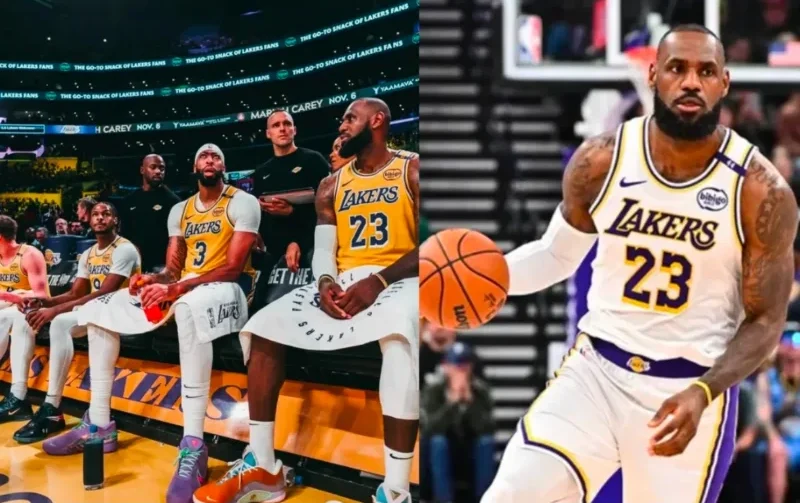LeBron James Missing Games: The Context
LeBron James, widely regarded as one of the greatest basketball players of all time, has long been a cornerstone of the Los Angeles Lakers. His arrival in Los Angeles marked a significant moment in the franchise’s history, bringing not only a plethora of accolades and experience but also high expectations for success on the court. Over the years, James has demonstrated remarkable consistency, often leading the team in points, rebounds, and assists. His versatility and ability to perform at an elite level have elevated the Lakers, making him a critical component of their championship aspirations.
However, as with any athlete in a physically demanding sport like basketball, health and fitness provide challenges. James’ recent absence from key games, specifically the matchup against the Portland Trail Blazers, has raised questions among fans and analysts alike. While his impact transcends mere statistics, the implications of his absence are profound. The Lakers, while talented, rely heavily on James’ leadership and skills to navigate the competitive landscape of the NBA. Without him, the team may struggle to maintain its performance levels and cohesiveness, potentially jeopardizing their playoff positioning.
Fans have expressed concern regarding not only the immediate impact on the team’s dynamics but also the longer-term ramifications for James’ career. As he continues to age and contend with various injuries, including persistent soreness in his foot, it becomes crucial for him to manage his playing time strategically. His ability to remain viable throughout the season will be instrumental in the Lakers’ quest for championship glory. As the team faces these challenges, the context surrounding LeBron James’ absence becomes increasingly significant for fans, teammates, and the NBA at large.
Coach JJ Redick’s Statement: Insights on LeBron’s Situation
In light of LeBron James’ recent absence from games, Coach JJ Redick has shed light on the circumstances surrounding this decision. Redick emphasized the importance of player well-being, particularly in the high-pressure environment of professional sports. He acknowledged that LeBron’s absence stems from personal reasons that must be respected by fans and the media alike. Redick’s remarks remind us that athletes are not merely performers; they are individuals who face personal challenges and priorities that can impact their careers.
Redick highlighted that in modern athletics, mental and emotional health has become an increasingly recognizable facet of player care. As a former player himself, Redick understands the intense scrutiny athletes face, especially those in the spotlight like LeBron. He asserted that it is crucial for players to communicate their needs, whether they relate to injuries, mental health, or personal matters, in a manner that is transparent yet respectful of their privacy. The expectation is that such discussions take place within a supportive environment, ensuring that athletes feel secure in voicing their concerns.
The confidentiality surrounding personal matters in professional sports is a significant aspect of team dynamics. Teams often navigate these issues delicately, balancing the need for transparency with the players’ right to privacy. Redick’s insights echo the sentiment that the wellness of athletes should always be a priority, enabling them to perform at their best. The absence of a star player like LeBron raises questions, but it also serves as a reminder that the human element is central to the game. Hence, fostering an atmosphere of understanding within sports teams remains vital for nurturing talent.
The Personal Reasons Behind LeBron’s Absence
LeBron James, a paragon of basketball excellence, is not just defined by his on-court performance but also by the complex personal life that accompanies his status as a superstar athlete. Athletes, including James, often face an array of personal challenges that can significantly impact their mental and emotional well-being. These challenges can range from family responsibilities, mental health issues, to the immense pressure of public scrutiny, all of which can lead to the need for a temporary hiatus from the game.
In the high-stakes environment of professional sports, the mental resilience of an athlete is crucial. However, even the most diligent competitors experience periods of stress and overwhelming expectations. For members of the public, it may be difficult to grasp that personal reasons for missing games extend beyond mere inconveniences; they often encompass deep emotional needs for self-care and recovery. For LeBron, taking time off is not indicative of weakness but rather a necessary act of maintaining overall health and performance quality.
Moreover, this approach to mental and emotional health is increasingly recognized across professional sports. LeBron’s absence serves as a reminder of the importance of seeing athletes as whole individuals rather than just entertainers. By addressing personal issues openly, he not only sets a precedent for his peers but also humanizes the pressures that come with fame. Such breaks can enhance player longevity, contributing to a healthier career trajectory. As athletes prioritize their well-being, the long-term benefits are evident in sustained performance levels and, ultimately, in their contributions to the sport.
Sore Foot: An Insight into LeBron’s Physical Health
LeBron James, renowned for his exceptional skills and athleticism on the basketball court, is not immune to the physical challenges that come with such a demanding sport. One of the significant concerns over the course of his illustrious career has been his sore foot. This condition is not unique to him; many athletes, particularly basketball players, frequently experience foot-related injuries that can impede performance and longevity.
The foot is a complex structure comprising bones, ligaments, and tendons, all of which are susceptible to injuries during high-impact sports such as basketball. Common issues include plantar fasciitis, tendonitis, and stress fractures, all of which can lead to pain, swelling, and limited mobility. Recovery from such injuries varies from athlete to athlete, depending on the severity and the specific circumstances surrounding the injury. For high-caliber players like LeBron, a strategic approach to treatment and rehabilitation becomes imperative. This may involve a combination of rest, physical therapy, and even advanced medical interventions to ensure a swift return to full activity.
Teams in the National Basketball Association (NBA) have developed extensive protocols for managing player health and injuries. Monitoring systems are in place to assess the physical demands on players, and medical teams are dedicated to addressing ailments proactively. The significance of early diagnosis and treatment of injuries cannot be overstated, as timely interventions can prevent more severe complications and prolong an athlete’s career.
Furthermore, addressing physical health is critical for maintaining performance levels and overall career longevity. For a player with the immense responsibilities and expectations that LeBron James faces, prioritizing his recovery and overall well-being becomes a vital aspect of his ongoing success and impact in the sport.




